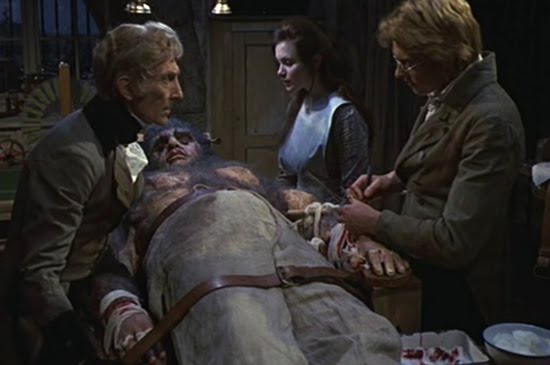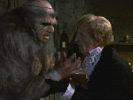Eye For Film >> Movies >> Frankenstein And The Monster From Hell (1973) Film Review
Frankenstein And The Monster From Hell
Reviewed by: Jennie Kermode

The last of Hammer Horror's six Frankenstein films, with Peter Cushing playing the legendary Baron for the seventh time, this is not the most sophisticated in terms of story and theme but it is superbly played all round. It's notable as the final film by much loved director Terence Fisher, and for bringing together Cushing and Dave Prowse (here delivering a different take on his Horror Of Frankenstein monster) four years before the former would play Grand Moff Tarkin to the latter's Darth Vader in Star Wars. With a supporting turn from Patrick Troughton on the eve of his incarnation as the second Doctor Who, and half a dozen fine British character actors at its command, it delivers its unlikely narrative with serious aplomb.
Shane Briant - fresh from the underrated Straight On Till Morning and on the verge of becoming hammer's Dorian Gray - plays a young scientist obsessed with Frankenstein's work, abruptly sent to a lunatic asylum for his trouble. There he discovers that the director (John Stratton) is severely unhinged and that the place is effectively being run by Frankenstein, who has faked his own death and then had himself hired as the institution's doctor in residence. Assisted by a mysterious young mute woman (Bond girl Madeline Smith), the Baron has arranged to continue his life's work - the struggle to create a living man. In a place where death comes easily, he has a splendid choice of materials. It doesn't take much convincing for the young man to become his assistant, but as things begin to go awry, the moral questions raised by the work become increasingly problematic.

Although the script is often heavy handed, Cushing delivers his lines with a clipped precision that brings absolute conviction to the role. Personally certain of the Baron's ultimate good intentions - to advance science and thereby save lives - he invests the character with a single-minded passion that brings balance to the film even when every other voice speaks against him. Surrounded as the Baron is by the insane, it's easy to sympathise with his frustrations at the inability of the common man to understand why his work matters, but his own sanity is gradually called into questions as the story progresses. Briant, meanwhile, gives us something differently ambiguous, perhaps as careless ethically as he is in his practical work. Only Smith's character displays moral consistency, and despite the difficulties she faces, she comes across as one of Hammer's most level-headed and resourceful heroines, observant and efficient. It's an interesting departure from the studio's more familiar screamers.
Clearly low-budget but benefiting from intelligent set design that makes the money go a long way, Frankenstein And The Monster From Hell has recently been restored and looks as good as new. A dramatic score by James Bernard, alternating between violin solos and thundering organ music, gives this something of the character of Hammer at its best, and it won't disappoint fans. Though it struggled on release, old fashioned in its time, the years have been kind and have let it take its rightful place as one of the strongest entries in the Frankenstein canon.
Reviewed on: 29 Mar 2014


















